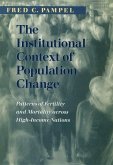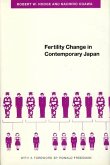For economists the work shows the advantages of moving beyond individual decision-making and embedding fertility decisions in a 'local environment' with interpersonal information flows, 'atmospheric' or social externalities, norms, and customs. For sociologists the work shows that theorizing about interactions within social networks can be more sophisticated. The implications of social networks depend substantially on the specific contexts and stages of the demographic transition, and these differences can be used to empirically distinguish between social learning and social influence. Thirdly, the findings have important implications for population policy. The analyses in this book indicate when family planning is likely to diffuse and lead to rapid adoption of birth control, and they derive conditions where Pareto-improving policy measures are likely to exist.
Considerable controversy exists among demographers, economists, and sociologists over the causes of fertility change in developing and developed countries. The neoclassical economic approach to fertility is embraced by its supporters because it facilitates the application of sophisticated consumer and household production theory to one of the most private and intimate questions: a couple's reproductive behavior. Despite the theoretical appeal of the economic approach, it has been eschewed by many critics because of its lack of social and institutional context, its neglect of cultural factors, and its requirement of 'rationality'. The integration of social interaction with economic fertility models in this book emerges as a powerful tool to overcome many of these criticisms.
Hinweis: Dieser Artikel kann nur an eine deutsche Lieferadresse ausgeliefert werden.
Considerable controversy exists among demographers, economists, and sociologists over the causes of fertility change in developing and developed countries. The neoclassical economic approach to fertility is embraced by its supporters because it facilitates the application of sophisticated consumer and household production theory to one of the most private and intimate questions: a couple's reproductive behavior. Despite the theoretical appeal of the economic approach, it has been eschewed by many critics because of its lack of social and institutional context, its neglect of cultural factors, and its requirement of 'rationality'. The integration of social interaction with economic fertility models in this book emerges as a powerful tool to overcome many of these criticisms.
Hinweis: Dieser Artikel kann nur an eine deutsche Lieferadresse ausgeliefert werden.








